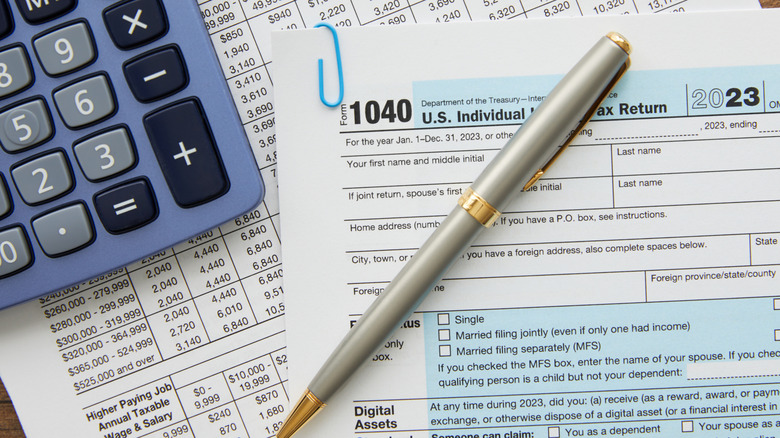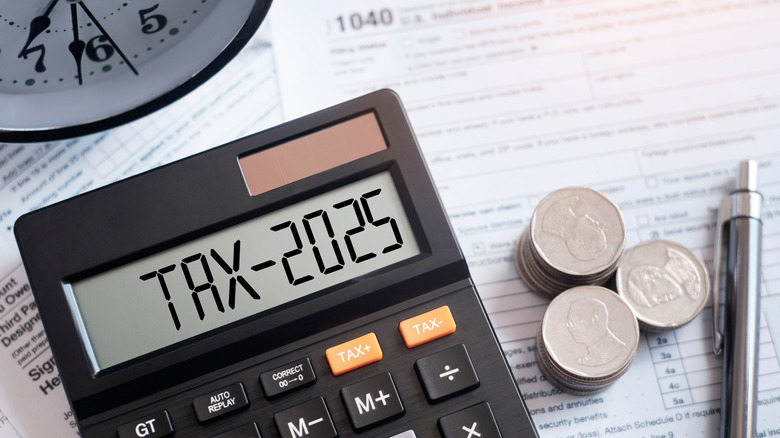Why Filing Taxes Too Early Might Be A Mistake
There is much to be wary of as you prepare your financial details for tax season. Each year, when the January slate of documents is released to earners around the country, a new march toward the tax deadline begins. While most filers will hope for a refund –- the average in 2024 was $2,850 — it's worth noting that by allowing yourself to be overtaxed and then taking a refund every spring, you're making a big mistake with your tax refund. Instead, you might consider adjusting your withholding figures so that you can keep more of your money with each paycheck.
No matter how you go about organizing your tax strategy, including finding crucial tax breaks to help minimize your obligation, there's another component that can't be ignored. The timing of your filing can make or break a quick turnaround with your refund, or create a nightmare scenario that instead piles on interest charges to your tax payment obligation. It's obviously not a good idea to delay filing your taxes for too long, even with extensions on the table for all filers. But filing too early can also be fraught with issues. There's no singular correct way to handle this annual task, but there does seem to be a sweet spot when it comes to getting the job done. Here's why jumping on your taxes as early as possible may not be the right approach for most Americans.
Filing your taxes early can lead to amendments
If you file your taxes early, there's a chance you're acting before you've been sent all the tax documents necessary to accurately complete your return. Brokerage accounts, workplaces, and other tax document-producing outlets are supposed to send out all necessary tax documents to clients and workers by January 31, but in practice this doesn't always happen. Moreover, "sent" and "received" aren't the same, so even documents sent on time may not be in your possession for a few extra days. If you file your taxes before you've received key details about the capital gains you've netted from stock market sales, for example, you'll end up guessing or leaving them out altogether. Unless you've diligently recorded your own transaction data, there's a near certainty that you'll need to file an amended return after the tax documents finally arrive in your inbox (or mailbox).
While the amendment process isn't particularly difficult, and the IRS outlines plenty of guidance on using amendment tools like its 1040-X form, the reality is that it creates unneeded stress and extra tasks that you'll need to remember to complete. Starting over isn't fun for anyone, so waiting to make sure you have all the necessary forms and documents is typically considered good practice. Filing your taxes before the April 15 deadline is crucial to avoiding the downsides of late filing, as well. If you've already filed you may forget to make your changes before that date.
When to file early
Americans looking to get ahead of the game can generally begin filing their taxes in late January. At that point, the IRS starts accepting and working on tax refunds (or taking payment from those who owe additional tax). Americans with straightforward tax situations might be in a position to file their return right away, such as taxpayers that only have to deal with a salary and nothing more complicated (such as calculating mortgage interest for tax deductions for example). In these cases, an early filing can serve a different, beneficial purpose. Others, however, may find themselves needing to tackle additional tax-related tasks if they act too quickly. Jumping at the chase to file as soon as the window opens is only really valuable for taxpayers who are absolutely sure that they aren't missing key documents or details.
The earlier you file the faster you'll get access to your refund, making a quick filing a major benefit for those expecting a large check. Refund dollars can go a long way to paying off debts or adding to your savings, so many are eager to get theirs back from the government. The IRS expects to have refunds sent around 21 days after a tax return has been submitted and approved – although e-filers and those opting for direct deposits will get theirs the fastest. Additionally, those expecting an Earned Income Tax Credit or Additional Child Tax Credit will have to wait until mid-February to receive their tax refunds, thanks to the PATH Act.


